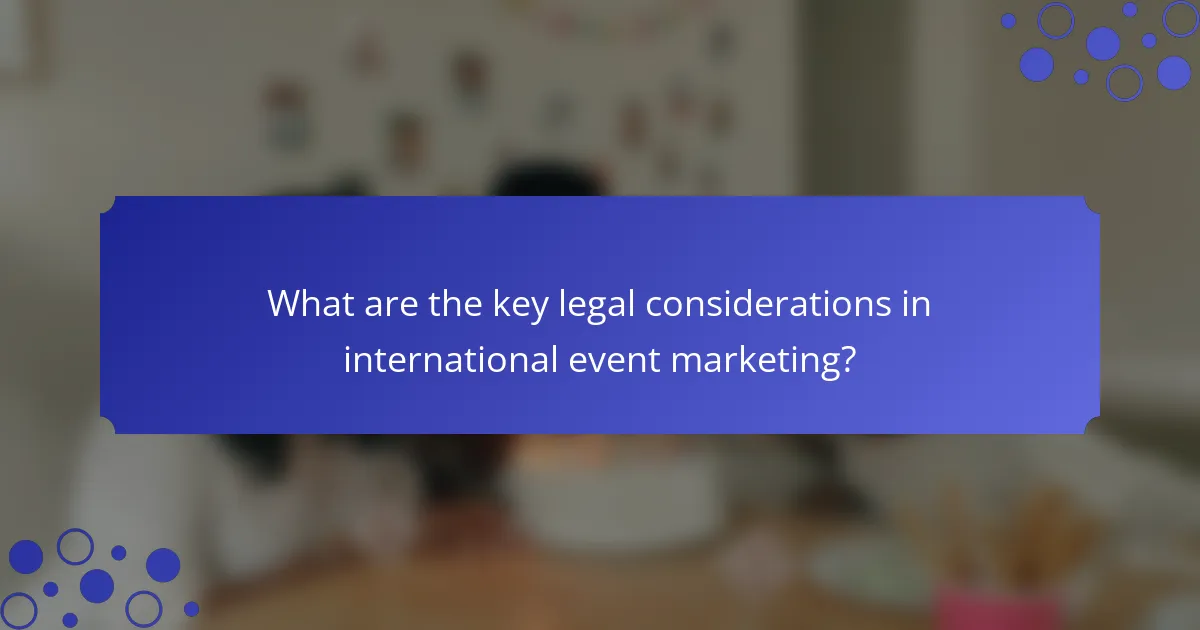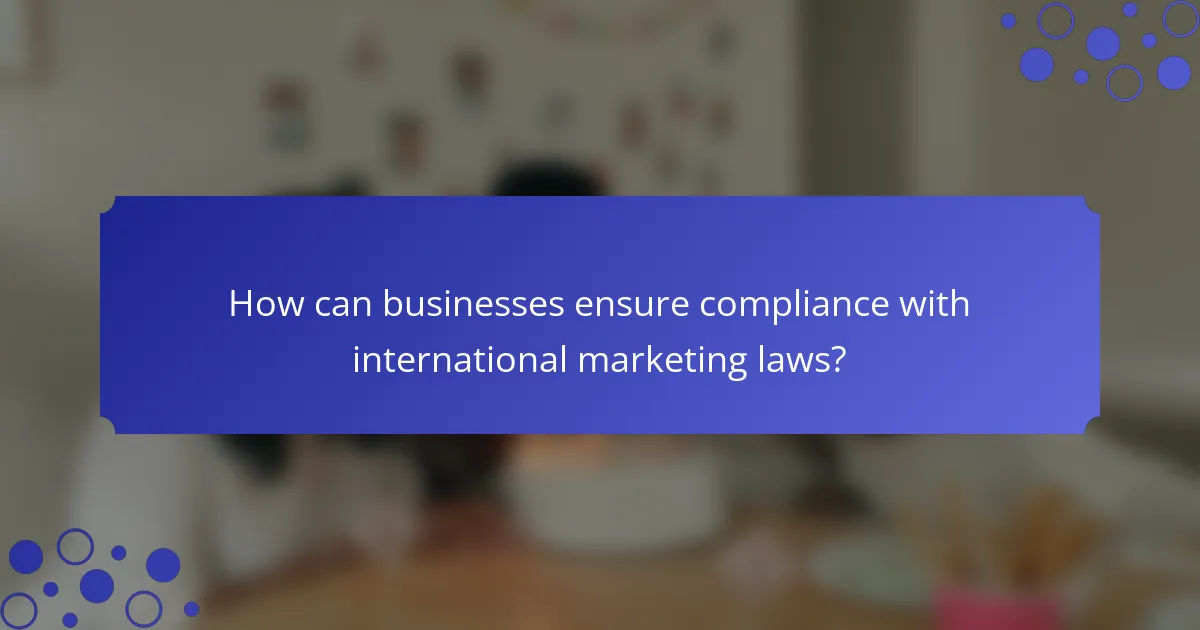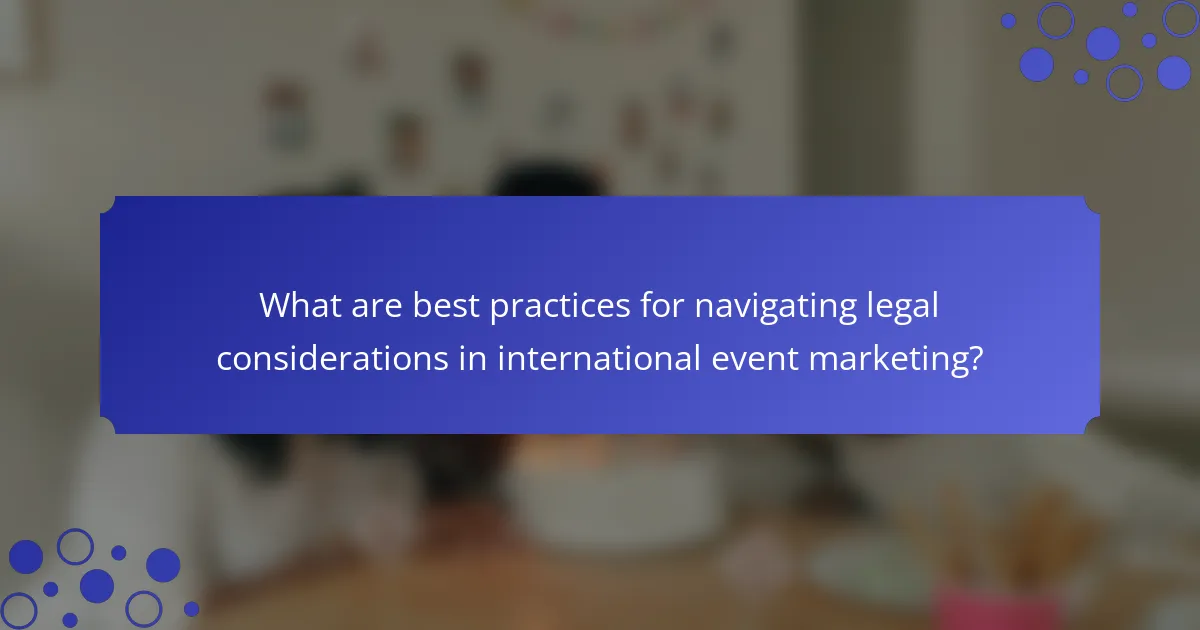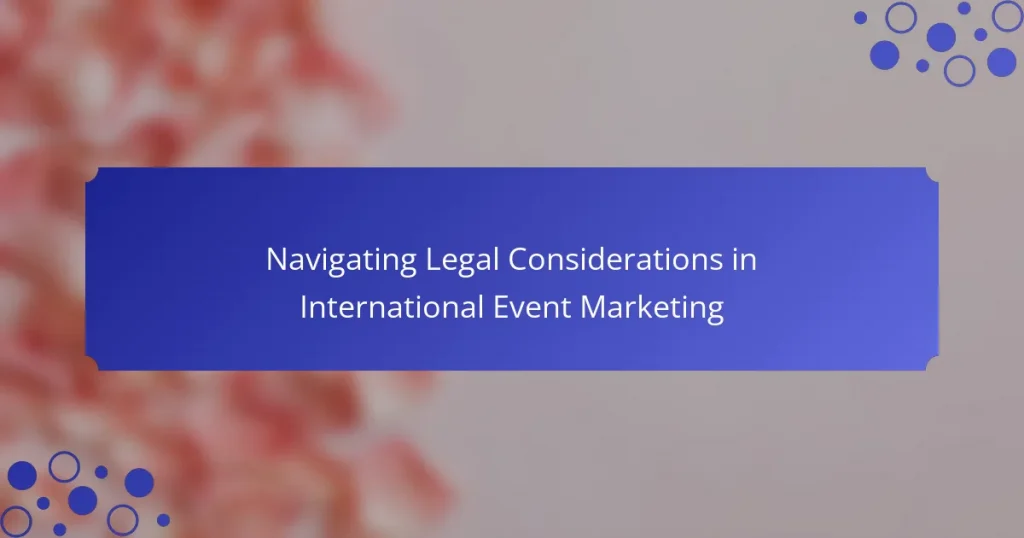The article focuses on navigating legal considerations in international event marketing, emphasizing the importance of compliance with local laws, intellectual property rights, and contract regulations. It outlines the necessity for marketers to understand specific advertising, promotion, and sponsorship laws in each country to avoid legal penalties. Key topics include the protection of brand logos and content, the significance of clear contracts between event organizers and sponsors, and adherence to data protection laws such as GDPR. Best practices for ensuring compliance involve thorough research, engaging local legal experts, obtaining necessary permits, and considering cultural sensitivities in marketing materials. Regular audits and the use of compliance software are also recommended to maintain ongoing adherence to diverse regulations.

What are the key legal considerations in international event marketing?
Key legal considerations in international event marketing include compliance with local laws, intellectual property rights, and contract regulations. Each country has specific laws governing advertising, promotions, and sponsorships. Marketers must understand these laws to avoid legal penalties. Intellectual property rights protect brand logos and content used in marketing. Violating these rights can lead to lawsuits and financial losses. Contract regulations dictate the terms between event organizers and sponsors. Clear contracts prevent disputes and ensure all parties understand their obligations. Additionally, data protection laws, such as GDPR in Europe, affect how personal information is collected and used. Non-compliance can result in hefty fines. Understanding these legal aspects is crucial for successful international event marketing.
How do international laws impact event marketing strategies?
International laws significantly impact event marketing strategies by regulating advertising practices, sponsorships, and data protection. These laws vary by country and can influence how brands communicate and engage with audiences. For instance, the General Data Protection Regulation (GDPR) in the European Union mandates strict guidelines for handling personal data. Non-compliance can result in hefty fines, which can deter companies from executing certain marketing strategies. Additionally, laws regarding intellectual property protect brand assets and require careful consideration in promotional materials. Countries may also impose restrictions on promotional activities, such as alcohol advertising in specific regions. Understanding these legal frameworks is essential for marketers to avoid potential legal issues and ensure successful international campaigns.
What specific regulations should marketers be aware of in different countries?
Marketers should be aware of various regulations that differ by country. In the United States, the Federal Trade Commission (FTC) enforces truth-in-advertising laws. These laws require advertisements to be truthful and not misleading. In the European Union, the General Data Protection Regulation (GDPR) governs data privacy and requires explicit consent for data collection. In Canada, the Canadian Anti-Spam Legislation (CASL) regulates electronic marketing and mandates consent before sending commercial electronic messages. Australia has the Australian Consumer Law (ACL), which protects consumers against misleading or deceptive conduct. Each country has specific compliance requirements that marketers must follow to avoid legal issues.
How do trade agreements influence event marketing practices?
Trade agreements significantly influence event marketing practices by shaping regulations and access to markets. These agreements can reduce tariffs and enhance trade relations, facilitating easier cross-border collaborations. For instance, the North American Free Trade Agreement (NAFTA) allowed companies to market events more effectively across the U.S., Canada, and Mexico. Additionally, trade agreements often establish standards for product quality and safety, impacting promotional strategies for event marketing. They can also provide legal frameworks that protect intellectual property, ensuring that marketing materials are safeguarded. Overall, trade agreements create an environment that encourages international event marketing by reducing barriers and enhancing cooperation among participating countries.
What are the risks associated with non-compliance in international event marketing?
Non-compliance in international event marketing can lead to significant legal and financial risks. These risks include hefty fines imposed by regulatory bodies. Companies may also face lawsuits from stakeholders or participants. Non-compliance can damage a brand’s reputation, leading to loss of customer trust. Additionally, businesses may encounter disruptions in event operations due to legal challenges. Regulatory penalties can vary by country, impacting overall profitability. Furthermore, non-compliance can result in loss of market access in certain regions. Overall, the implications of non-compliance can be severe and far-reaching.
What penalties can arise from failing to adhere to local regulations?
Penalties for failing to adhere to local regulations can include fines, legal action, and business license revocation. Fines can vary significantly based on the severity of the violation. Legal action may involve lawsuits from affected parties or governmental agencies. Revocation of business licenses can prevent future operations in that jurisdiction. In some cases, individuals may face criminal charges, leading to imprisonment. Regulatory agencies often impose penalties to ensure compliance and protect public interests. These consequences highlight the importance of understanding and following local laws in international event marketing.
How can businesses mitigate legal risks in their event marketing efforts?
Businesses can mitigate legal risks in their event marketing efforts by ensuring compliance with local laws and regulations. This includes understanding advertising laws, privacy regulations, and intellectual property rights. Conducting thorough research on the legal landscape of the event location is essential. Consulting with legal professionals can provide tailored advice for specific situations. Implementing clear contracts with vendors and partners helps establish responsibilities and liabilities. Additionally, obtaining necessary permits and licenses is crucial for legal compliance. Training staff on legal issues related to event marketing can further reduce risks. Regularly reviewing and updating policies ensures ongoing compliance with evolving laws.

How can businesses ensure compliance with international marketing laws?
Businesses can ensure compliance with international marketing laws by conducting thorough research on regulations in each target market. This includes understanding local advertising standards, consumer protection laws, and data privacy regulations. Companies should consult legal experts specializing in international trade and marketing. They can also implement compliance training for their marketing teams. Regular audits of marketing practices help identify potential legal issues. Utilizing compliance software can streamline adherence to diverse regulations. Finally, businesses should stay updated on changes in international laws to maintain ongoing compliance.
What steps should be taken to research legal requirements in target markets?
Identify the target market’s jurisdiction. Gather relevant legal documents and regulations. Consult government websites for up-to-date information. Engage local legal experts for insights and interpretations. Review industry standards and compliance requirements. Analyze case studies of similar events in the market. Document findings for clarity and future reference.
What resources are available for understanding foreign marketing regulations?
Government websites provide essential resources for understanding foreign marketing regulations. These sites often include guidelines and compliance requirements for specific countries. The World Trade Organization (WTO) offers information on international trade agreements that impact marketing. Industry associations, such as the American Marketing Association, publish reports and best practices related to global marketing. Legal firms specializing in international trade law provide insights and updates on regulatory changes. Academic journals also feature research articles analyzing foreign marketing regulations. Online courses on international marketing often cover legal considerations as part of their curriculum.
How can businesses stay updated on changes in international laws?
Businesses can stay updated on changes in international laws by subscribing to legal update services. These services provide real-time information on legal changes. They often include newsletters and alerts tailored to specific industries. Additionally, businesses should engage with legal professionals who specialize in international law. This engagement ensures access to expert advice and insights. Attending relevant conferences and seminars can also be beneficial. Such events often cover recent legal developments. Joining industry associations can provide networking opportunities and resources. These associations frequently share updates on legislative changes affecting their members.
What role do contracts play in international event marketing?
Contracts serve as legal frameworks in international event marketing. They outline the responsibilities and expectations of all parties involved. Contracts help mitigate risks associated with cross-border transactions. They provide clarity on payment terms, deliverables, and timelines. Contracts also address intellectual property rights and confidentiality agreements. They ensure compliance with local laws and regulations in different countries. Dispute resolution mechanisms are often included in contracts to handle conflicts. Overall, contracts are essential for establishing trust and accountability in international event marketing.
How can contracts protect businesses from legal disputes?
Contracts protect businesses from legal disputes by clearly outlining the rights and obligations of each party involved. They establish legally binding agreements that specify terms of service, payment, and responsibilities. This clarity helps prevent misunderstandings that could lead to conflicts. For instance, a contract can include dispute resolution clauses that dictate how disagreements will be handled. Such provisions may require mediation or arbitration, which can be less costly than litigation. Additionally, contracts can include indemnity clauses that protect one party from losses caused by the other party’s actions. By having these protections in place, businesses can mitigate risks associated with potential legal issues. In fact, studies show that written contracts significantly reduce the likelihood of disputes compared to verbal agreements.
What essential clauses should be included in event marketing contracts?
Essential clauses in event marketing contracts include the scope of services, payment terms, cancellation policies, and liability limitations. The scope of services defines what is to be provided by each party. Payment terms specify amounts, due dates, and methods of payment. Cancellation policies outline conditions under which the contract can be terminated and any associated penalties. Liability limitations protect parties from unforeseen damages or losses. These clauses are crucial for ensuring clarity and protecting the interests of all parties involved.

What are best practices for navigating legal considerations in international event marketing?
Best practices for navigating legal considerations in international event marketing include understanding local laws and regulations. Each country has specific rules regarding advertising, permits, and data protection. Researching these legal frameworks is essential for compliance. Engaging local legal experts can provide valuable insights into jurisdiction-specific requirements. Additionally, obtaining necessary permits and licenses before the event is crucial to avoid fines. It is also important to consider cultural sensitivities in marketing materials. This helps in avoiding potential legal disputes arising from misinterpretation. Lastly, ensuring contracts with vendors and sponsors are clear and compliant protects all parties involved.
How can businesses build a compliance-focused marketing strategy?
Businesses can build a compliance-focused marketing strategy by integrating legal regulations into their marketing plans. First, they should conduct thorough research on applicable laws in their target markets. This includes understanding advertising standards, data protection laws, and consumer rights regulations. Next, businesses must develop clear internal policies that align with these legal requirements. Training staff on compliance issues is essential to ensure everyone understands their responsibilities. Regular audits should be conducted to assess adherence to these policies. Additionally, businesses should consult with legal experts to navigate complex regulations effectively. By prioritizing compliance, businesses can mitigate risks and enhance their brand reputation in international markets.
What training should marketing teams receive regarding legal considerations?
Marketing teams should receive training on compliance with advertising laws. This includes understanding regulations such as the Federal Trade Commission (FTC) guidelines. Teams must be aware of the legal implications of false advertising and misleading claims. They should also learn about data protection laws, including the General Data Protection Regulation (GDPR) for international marketing. Training should cover intellectual property rights, including copyright and trademark laws. Additionally, teams should understand contract law relevant to partnerships and sponsorships. Awareness of local laws in different markets is crucial for international events. This training helps mitigate legal risks and ensures ethical marketing practices.
How can businesses create a culture of legal awareness in event marketing?
Businesses can create a culture of legal awareness in event marketing by implementing comprehensive training programs. These programs should educate employees about relevant laws and regulations. Regular workshops can reinforce this knowledge. Additionally, businesses should develop clear legal guidelines for event planning. Providing accessible resources, such as legal handbooks, is essential. Encouraging open communication about legal issues fosters a proactive approach. Regularly updating staff on legal changes keeps the culture dynamic. Research indicates that organizations with strong legal awareness reduce compliance risks significantly. For instance, a study by the Corporate Executive Board found that companies with legal training programs experience fewer legal disputes.
What common legal pitfalls should marketers avoid in international events?
Marketers should avoid several common legal pitfalls in international events. One major pitfall is failing to comply with local regulations. Each country has specific laws regarding advertising, promotions, and event organization. Ignoring these laws can lead to fines or event cancellation.
Another pitfall is not securing necessary permits and licenses. Many countries require specific documentation for hosting events. Without these, marketers risk legal action.
Intellectual property infringement is also a critical issue. Marketers must ensure they have rights to use logos, images, and other content. Otherwise, they may face lawsuits from copyright holders.
Data protection laws vary significantly across jurisdictions. Marketers should adhere to regulations like GDPR in Europe. Non-compliance can result in hefty penalties.
Lastly, marketers should be cautious about contractual agreements. Ambiguous terms can lead to disputes with vendors or partners. Clear contracts help mitigate risks.
These pitfalls highlight the importance of thorough research and legal consultation when planning international events.
What are the most frequently encountered legal issues in event marketing?
The most frequently encountered legal issues in event marketing include intellectual property rights, contracts, and liability concerns. Intellectual property rights often involve trademark and copyright infringement. Event marketers must ensure they have the right to use logos, music, and images. Contracts are crucial in defining the roles and responsibilities of all parties involved. Clear agreements help prevent disputes over deliverables and payments. Liability concerns arise from potential injuries or damages during events. Event organizers may face lawsuits if attendees are harmed. Compliance with advertising regulations is also essential. Misleading advertising can lead to legal penalties. Understanding local laws is critical, especially for international events. Each jurisdiction may have different requirements and restrictions.
How can businesses learn from past legal challenges faced by others?
Businesses can learn from past legal challenges faced by others by analyzing case studies and outcomes. Reviewing documented legal disputes reveals common pitfalls and effective strategies. For instance, the 2018 GDPR enforcement highlighted the importance of data protection compliance. Companies that studied these cases adjusted their policies proactively. Engaging with legal experts who specialize in past cases provides additional insights. Networking with other businesses allows sharing of experiences and lessons learned. This collaborative learning fosters a culture of compliance and risk management. By implementing best practices identified through these analyses, businesses can mitigate their own legal risks.
What practical tips can enhance legal compliance in international event marketing?
To enhance legal compliance in international event marketing, organizations should conduct thorough research on local laws. Understanding regulations in each target market is crucial. This includes advertising laws, data protection regulations, and intellectual property rights. Engaging local legal experts can provide valuable insights. They can help identify potential legal risks specific to the region. Additionally, obtaining necessary permits and licenses is essential for compliance. Organizations should also create clear contracts with vendors and partners. This ensures all parties understand their legal obligations. Regular training on compliance for staff involved in marketing can further mitigate risks. These steps collectively contribute to a legally compliant international event marketing strategy.
The main entity of the article is ‘international event marketing.’ The article provides a comprehensive overview of the key legal considerations that marketers must navigate when conducting international event marketing. It covers essential topics such as compliance with local laws, intellectual property rights, contract regulations, and the implications of non-compliance. Additionally, it discusses the influence of trade agreements on marketing practices and offers practical tips for mitigating legal risks. The article emphasizes the importance of understanding diverse regulations and implementing best practices to ensure successful and legally compliant marketing strategies across different countries.


